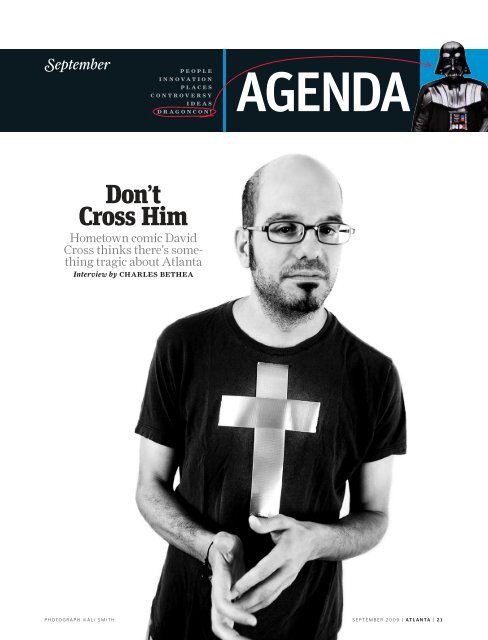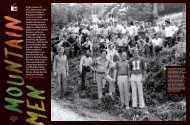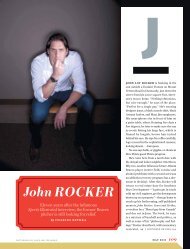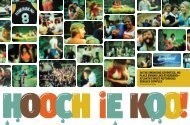You also want an ePaper? Increase the reach of your titles
YUMPU automatically turns print PDFs into web optimized ePapers that Google loves.
September<br />
p e o p l e<br />
i n n o va t i o n<br />
p l a c e s<br />
c o n t r o v e r s y<br />
i d e a s<br />
d r a g o n c o n !<br />
<strong>agenda</strong><br />
Don’t<br />
Cross Him<br />
Hometown comic David<br />
Cross thinks there’s something<br />
tragic about Atlanta<br />
Interview by charles bethea<br />
p h o t o g r a p h © a l i s m i t h s e p t e m b e r 2 0 0 9 | at l a n ta | 2 1
AGENDA<br />
Starting Block David Cross<br />
appreciate it if you’d<br />
ask your questions in a highpitched<br />
Southern-belle accent,” “I’d<br />
David Cross tells me. The comedian isn’t<br />
kidding. Cross, forty-five and an Atlanta<br />
native, pushes the boundaries of his interviews<br />
the same way he pushes his political<br />
and sketch comedy, which has been<br />
illustrated—to critical acclaim, if not mainstream<br />
success—on stage (Shut Up, You<br />
F--king Baby), the small screen (Arrested<br />
Development), the big screen (Year One), and<br />
now in his new book of memoir/essays/<br />
satire, I Drink for a Reason.<br />
You’ve described yourself as “sort of Southern.”<br />
What does that mean? I haven’t lived<br />
in the South for more than twenty years.<br />
Still, I have what I’d consider Southern<br />
traits. They come out at odd moments. I<br />
remember walking down the sidewalk<br />
with this girl I was dating, and I went a few<br />
paces over to my left and spit in the street.<br />
She was from Houston, and she goes, “Oh,<br />
nice Southern boy, spits in the street.”<br />
So when you mock Atlanta in your stand-up<br />
routines, are you playing it up? It’s a lovehate<br />
relationship. I am disappointed with<br />
Atlanta. I love the people, the music scene.<br />
Some of my favorite bars and restaurants<br />
are there. I’ve got family there and lots of<br />
friends. But from the late nineties on, it<br />
really sold a lot of its soul and beauty to<br />
the strip-mall-ification of it. Where once<br />
there was this beautiful patch of woods<br />
or cool buildings, there’s now yet another<br />
Barnes & Noble or Linens ’n Things. I<br />
know it’s growing, but come on. There’s a<br />
small tragedy about it.<br />
What was Northside High School like in the<br />
early eighties? I was actually one of the few<br />
people who had a really good experience<br />
in high school. I had been going to school<br />
in Roswell at a place called Crestwood. I<br />
felt so out of place, and I didn’t have many<br />
friends. It was very white, Baptist, suburban—just<br />
a world I wasn’t comfortable in,<br />
though I tried: I actually chewed tobacco<br />
for a year and ran around in a sleeveless<br />
puffy vest. But Northside was a school<br />
of the arts; I got to spend that time with a<br />
great acting teacher who steered me in a<br />
good direction.<br />
Where’d you hang out? As a kid it was all<br />
about riding my bike down to the creek<br />
and the woods, catching crawdads, playing<br />
with firecrackers. This was in Roswell.<br />
At fifteen, I moved to a place off of Howell<br />
Mill, and my friends and I just drank.<br />
We’d go to Collier Park, and climb a billboard<br />
Downtown, by the Days Inn. We’d<br />
go to the top of the Biltmore and drink<br />
beer up there, and the top of the Hyatt<br />
Regency. There were midnight movies at<br />
Perimeter Mall. I had a fake ID, so I’d go to<br />
688, and the bistro on Spring Street. Then,<br />
sometimes, comedy clubs: I started doing<br />
stand-up shortly before my eighteenth<br />
birthday. Then I got into the whole crazy,<br />
artsy, New Wave scene. I hung out with<br />
RuPaul and some of those guys. Then,<br />
about three in the morning, go to the<br />
Waffle House.<br />
Are you proud of your book? I am proud<br />
of it. At least that I wrote it. It’s not going<br />
to change the world, and it’s not going to<br />
be compared to Mark Twain or Voltaire.<br />
But for what it is, I think it’s pretty good.<br />
I’m happy that it’s not a rehash of my<br />
stand-up. Way too many comedians get<br />
a book deal and put the stand-up they<br />
don’t use anymore in it. I think that’s<br />
reprehensible. n<br />
t y l e r p e r r y: K e v i n W i n t e r / G e t t y I m a g e s<br />
$41,030,947<br />
$26,853,816<br />
OPENING<br />
WEEKEND<br />
the perry allure<br />
On September 11, Tyler Perry’s I Can Do Bad All by Myself opens in theaters. Though it<br />
may be critically panned (his work tends to be), the Atlanta-filmed Bad will likely be<br />
box-office gold thanks to ardent support from Perry’s core audience—black, middleclass<br />
churchgoers—and a winning, family-oriented formula. Perhaps this is why, despite<br />
poor reviews, Perry is able to lure acclaimed black actors to his films; Bad stars Taraji<br />
P. Henson, who was Oscar-nominated for her supporting role in last year’s The Curious<br />
Case of Benjamin Button. A glance at Button’s numbers, though, compared with Perry’s<br />
most recent release, Madea Goes to Jail, illustrates his reach. Maybe actors such as<br />
Henson can’t resist broadening their fanbase (and a chance at a starring role).<br />
$1,436,640<br />
$1,062,578<br />
domestic<br />
gross<br />
(Daily Intake)<br />
n Madea Goes to Jail n The Curious Case of Benjamin Button<br />
$42,674<br />
$41,084<br />
avg. gross<br />
per theater<br />
417%<br />
Domestic return<br />
on investment<br />
-15%<br />
2 2 | at l a n ta | s e p t e m b e r 2 0 0 9





